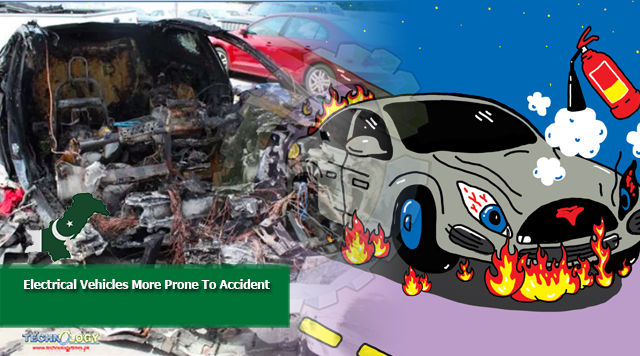The local auto industry has feared that electric vehicles would cause accident if international standards were not ensured.

“We have to be careful about recommending adoption of UNR 136 for vehicle safety, IEC 60335-2-29 for household chargers and EEC 134 for Max Speed for 2-wheelers and UNR 100 for 4-Wheelers,” said Mashood Khan, Director Mehran Commercial Enterprises (MCEs).
He added that if standards are not adopted as recommended in the policy, we should be ready for accident like fire in the house due to charging, battery blast, unwanted operation, blast during operation etc.
“Besides, conversion of existing shapes into EV is equally dangerous as there is no battery latching system in the existing vehicles. Only scooter shape is recommended as it complies with UNR 136 for battery safety.”
“Battery is a bomb if not latched properly in the bike. There are hundreds of videos available on social media where one can easily see accidents due to the failure of batteries, especially in bikes,” said Mashood.
Regarding the federal government’s EV policy, he said: “This policy needs to be established because adopting standards will be the key for successful adoption of EV in transport systems. Otherwise we would not benefit from global experience which is now moving towards safe EV.
Pakistan’s first ever National Electric Vehicle Policy (NEVP) 2019 has been approved by the cabinet in November 2019. The government claims that it is a forward-looking step needed to deal with climate concerns from transport sector emissions with rapidly rising vehicle use.
Further, it would help reduce the overall oil import bill and operational cost of vehicles for consumers.
Mashood said the policy makers need to understand that currently the automobile sector is in shambles in the country so bringing in EVs may further aggravate the industry’s issues.
“We need to create a win situation, the infrastructure needed to be provided parallel to ensure that there is a future for this industry is the key, and it is huge.
This will reflect if the initial demand turns into a possibility of new local industry. It includes, generating clean electricity, charging unit infrastructures to ensure long mobility, maintenance network, and integrating the EV building block technology in Pakistan.
It is pertinent to mention here that the auto sector has witnessed a steep decline of -36.5 percent during July-March FY-2020 as compared to -7.56 percent fall in corresponding period.
Major contributor to this dip is the passenger car segment due to its weight in the LSM index. During the period under review, car production declined by -47.9 percent. “Automobile sector has remained in distress for the second consecutive year. The previous year ended with massive fall in production and sales.
“Besides, industrial fall continued to grip the automobile sector with uncertainty and the sector has almost reduced to half during the period,” he said. So, he added, the introduction of EVs in this situation may not bode well for the manufacturers and the government.
Stressing on the need to encourage make in Pakistan approach, Tecnopack CEO Aamir Allawala said that “New HS codes should be created for specific parts of hybrid and electric vehicles, plug-in hybrids and battery-powered electric vehicles falling under PCT heading 87.03 and 87.04 for completely knocked down (CKD) kits manufacturing at 10% customs duty.”
He pointed out that SRO-587 granted 50% sales tax exemption to imports and subsequent sales of completely built units (CBUs) of hybrid and electric vehicles.
He urged the government to extend a similar benefit to the locally produced hybrid electric vehicles, plug-in hybrids and battery-powered electric vehicles by amending the SRO.
“All locally produced hybrid and electric vehicles, plug-in hybrids and battery electric vehicles should be exempted from the federal excise duty irrespective of their capacity,” he stressed.
Originally published at Business recorder